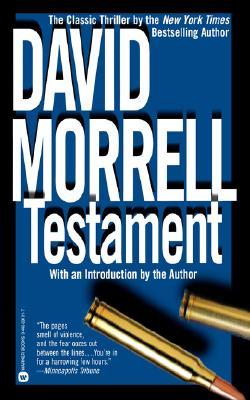 By DAVID MORRELL (Warner Books; 1975/93)
By DAVID MORRELL (Warner Books; 1975/93)
One of the most relentless thrillers of all time, and, if you ask me, the finest of David Morrell’s novels. Morrell is of course the man who created Rambo in 1972’s blistering FIRST BLOOD, a violent and horrific (far more so than the popular Sly Stallone flick adapted from it) chase thriller that is often credited with bringing extreme violence into the literary mainstream. TESTAMENT, Morrell’s follow-up novel, is also a chase thriller, and far meaner—so much so that in his introduction to the 1993 edition Morrell states that he’s “resolved that I’ll never again delve as deeply into the bleakness of my psyche as I did in this book.”
The tone is set in the opening pages, when the protagonist’s baby is poisoned. Said protagonist is Bourne, a quiet suburban man who (not unlike David Morrell himself) makes his living writing thrillers. It seems he’s written a profile of The Guardians of the Republic, an ultra-right wing paramilitary group, that portrayed its subjects in a negative light…and now they’ve vowed to eliminate its author and his family.
The group has quite a diverse membership spread out across the country, including Bourne’s home town. The harassment grows so intense that Bourne and his family are forced into the wilderness, where Bourne’s wife is shot and his daughter dies of exposure in a harsh winter storm. Bourne almost joins her, but is saved by the attentions of a lost dog (representing this book’s sole ray of hope). Regathering his strength, Bourne hits the revenge trail, leading to a conclusion that is, frankly, a bit maddening. As Morrell points out in his introduction, in writing this novel he was aiming for more than a simple action-revenge potboiler, looking to make a statement about violence and readers’ reactions to it. Frankly, I’m not sure that I got out of the perverse ending what Morrell wanted me to, but the conclusion does succeed in elevating the action to an entirely different, more complex, level.
The prose, as always with Morrell, is spare and precise to a fault. The narrative moves fast, propelled by short (often a scant 2-3 pages long) and extremely well delineated chapters. The violence is quite graphic, as you might expect, but never excessive (which I don’t know that I can say about FIRST BLOOD). Even if it isn’t strictly a horror novel, TESTAMENT contains some of Morrell’s most overtly horrific passages, in particular a rather surreal mid-book stopover in a ghost town where an old man tells Bourne’s daughter a nasty story, and Bourne’s climactic sojourn in an ice cave while a storm rages overhead, surely one of the most profoundly nightmarish passages in Morrell’s oeuvre.
The wilderness setting, it must be said, is one of book’s most effective elements. DELIVERANCE is the only other 1970s novel I can think of that conveys such an awed respect for the dark powers of nature. Morrell took a survival course in the Colorado wilderness in preparation for writing this book, and the experience is evident in its fully convincing portrayal of an elemental world of trees, rocks, earth and snow.
Flaws? In order not to be too effusive in praising what is admittedly one of my favorite books, I suppose I can find some misconceived elements. Of the “controversial” ending one can make a reasonable argument either for or against it. The dog who shows up to save the hero’s life and becomes his loyal companion may seem a tad out of place, but, as I said above, does at least offer a ray of hope in an otherwise completely relentless narrative of violence and despair. The character of Borne, meanwhile, will never supplant Rambo, being a near nonentity. Morrell, it seems, viewed Bourne as symbolic, of Modern Man (or something), than a flesh and blood character. But TESTAMENT works, pure and simple.
